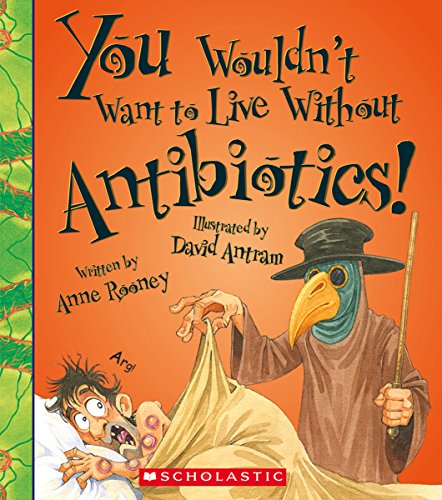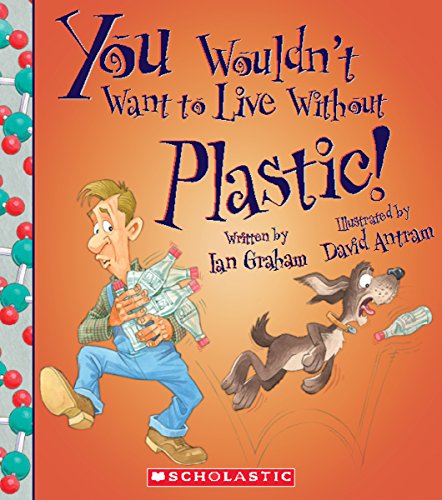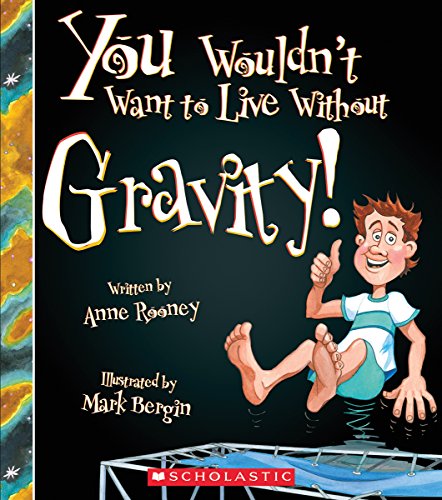-
You Wouldn't Want to Live Without Vaccinations!
Anne Rooney, David Antram, David Salariya
Library Binding (Franklin Watts, Feb. 1, 2015)Describes what vaccines are, how they work, and how they are beneficial to all of us. T
T
-
You Wouldn't Want to Live Without Soil!
Professor of Cardiovascular Medicine Ian Graham
Paperback (Salariya Book Company Ltd, Jan. 7, 2016)Soil supplies a surprising variety of materials for making things. If soil didn't exist, life would have developed differently on Earth and humans probably wouldn't be here. You Wouldn't Want to Live Without Soil! is part of a brand-new science and technology strand within the internationally acclaimed You Wouldn't Want to Be series. T
T
-
You Wouldn't Want To Live Without Toilets
Fiona MacDonald, David Antram
Library Binding (Turtleback, Sept. 1, 2014)FOR USE IN SCHOOLS AND LIBRARIES ONLY. Uses humor in both text and illustrations to describe what it would be like to live without the toilet and describes how people managed to dispose of their waste in the past. R
R
-
You Wouldn't Want To Live Without Boogers!
Alex Woolf
Library Binding (Turtleback Books, Sept. 1, 2016)FOR USE IN SCHOOLS AND LIBRARIES ONLY. T
T
-
You Wouldn't Want to Live Without Pain!
Fiona Macdonald, David Antram
Library Binding (Franklin Watts, Jan. 15, 2016)Imagine living in a world without pain.This series takes readers (Ages 8-12) on a historical journey, examining how people coped in the past and how they developed ingenious ways to make life safer and less unpleasant. Each book features full-color cartoon-style illustrations and hilarious speech bubbles to heighten interest, making the series attractive even to reluctant readers.You wouldn't get headaches or stomach aches, and it wouldn't hurt when you cut yourself or touched something hot. A pain-free world may sound wonderful, but if pain did not exist, our lives would be very dangerous. We probably wouldn't survive for long. We would certainly be less healthy. And, just perhaps, we'd feel less good about ourselves. Learn about the science behind how our bodies are able to experience pain, the ways pain helps us to stay safe, and the ghastly reality of life before modern painkillers. R
R
-
You Wouldn't Want to Live Without Antibiotics
Anne Rooney
Library Binding (Franklin Watts, Sept. 1, 2014)If antibiotics had not been discovered, would you be alive today? Nowadays we can treat all sorts of nasty injuries and illnesses, but it certainly wasnt so straightforward hundreds of years ago. In this title from the fantastic new You Wouldnt Want to Live Without series, youll learn all about the bizarre and gruesome ways that people used to combat infection: from maggots, to leeches, to moss! As you discover how bacteria work in your body, learn handy hints on how to survive throughout the ages, and discover how medicine is used in the present day, youll soon see why you really, really, wouldnt want to live without antibiotics! The well-organized text in this title allows readers to explore relationships between historic scientific events. Grade-appropriate contexts help readers determine the meaning of academic words and phrases while the vivid illustrations and text features help navigate the text and locate answers to questions. T
T
-
You Wouldn't Want to Live Without Bees!
Alex Woolf, David Antram
Library Binding (Franklin Watts, Sept. 1, 2016)What would happen if there were no bees in this world? It would be a disaster!This series takes readers (Ages 8-12) on a historical journey, examining how people coped in the past and how they developed ingenious ways to make life safer and less unpleasant. Each book features full-color cartoon-style illustrations and hilarious speech bubbles to heighten interest, making the series attractive even to reluctant readers.Without bees, we would, of course, have no honey. But we'd also lose a lot of other foods and useful products like cotton produced by plants that bees pollinate. Around half the fruit and vegetables in our supermarkets would disappear! Not only that, we would also lose the animals that eat these plants, and the animals that eat those animals! Some people are scared of bees, but there's rarely any need to be. Bees will sting in self-defence, but usually they don't disturb humans. Yet we need them. As far as important species are concerned, bees are at the top of the list - you really wouldn't want to live without them! R
R
-
You Wouldn't Want to Live Without Snot!
Professor Alex Woolf
Paperback (Salariya Book Company Ltd, Aug. 18, 2016)What if we didn't have snot and mucus? The insides of our bodies would be very dry, and we would find it hard to digest our food. We would also quickly become sick, because mucus protects us from dirt in the air that we breathe. But what exactly is this sticky, slimy stuff and why do we produce more of it when we have a cold? And what do animals like slugs and snails do with their mucus? You might find it a bit gross, but you wouldn't want to live without it! You Wouldn't Want to Live Without Snot! is part of a brand-new science and technology strand within the internationally acclaimed You Wouldn't Want to Be series. The clear, engaging text and humorous illustrations bring the subject to life and stimulate young readers' curiosity about the world around them. T
T
-
You Wouldn't Want To Live Without Dirt!
Ian Graham, Mark Bergin
Library Binding (Turtleback Books, Feb. 1, 2016)FOR USE IN SCHOOLS AND LIBRARIES ONLY. Learn about the ways dirt and soil have been used by humans over the centuries, from cave paintings to crop farming, and the exciting prospects for dirt and soil we may see in the future. S
S
-
You Wouldn't Want to Live Without Plastic!
Ian Graham, David Antram
Library Binding (Franklin Watts, Sept. 1, 2015)What if plastic was never created?It can come in any color of the rainbow, be smooth and glossy, or dull and rough-but how important is this seemingly indestructible material, and would you want to live without it? If you were to go around your room and start listing all the things made of plastic, that list would soon become very long. Plastic is in your computer, mobile phone, television, pens and even in the clothes you wear. In this new You Wouldn't Want to Live Without title, find out about what plastics are made from, who invented some of the first plastics-and try your hand at making your very own plastic! S
S
-
You Wouldn't Want To Live Without Sleep!
Jim Pipe, Mark Bergin
Library Binding (Turtleback Books, Feb. 1, 2016)FOR USE IN SCHOOLS AND LIBRARIES ONLY. Most people spend a third of their life sleeping-around 25 years or more! Sleeping is essential for health and happiness, but no one really knows why we do it or why we have strange dreams. Read on to learn about sleep studies, the benefits of sleep, and what can happen if we don't get enough sleep. Excerpts from Experts: Too much ""floppy"" tissue in our throat or nose can make us snore. The reef fish Halichoeres bivittatus is one of the world's deepest sleepers and can be lifted to the water's surface by hand without waking up. Leonardo da Vinci survived on two hours' sleep a day in short power naps. A good night's sleep before a test can help with critical thinking. W
W
-
You Wouldn't Want to Live Without Gravity!
Anne Rooney, Mark Bergin
Library Binding (Franklin Watts, Jan. 15, 2016)You don't really get a choice about gravity. If you live on Earth, you're going to have to live with it.This series takes readers (Ages 8-12) on a historical journey, examining how people coped in the past and how they developed ingenious ways to make life safer and less unpleasant. Each book features full-color cartoon-style illustrations and hilarious speech bubbles to heighten interest, making the series attractive even to reluctant readers.If you become an astronaut, you might get to escape from gravity for a while, but it will be waiting for you when you get home. But gravity does a lot of useful things - such as keeping us on the Earth and holding the entire universe together! Learn how gravity was discovered and why it helps us to understand everything from how toothpaste comes out of the tube to the movements of the planets. S
S